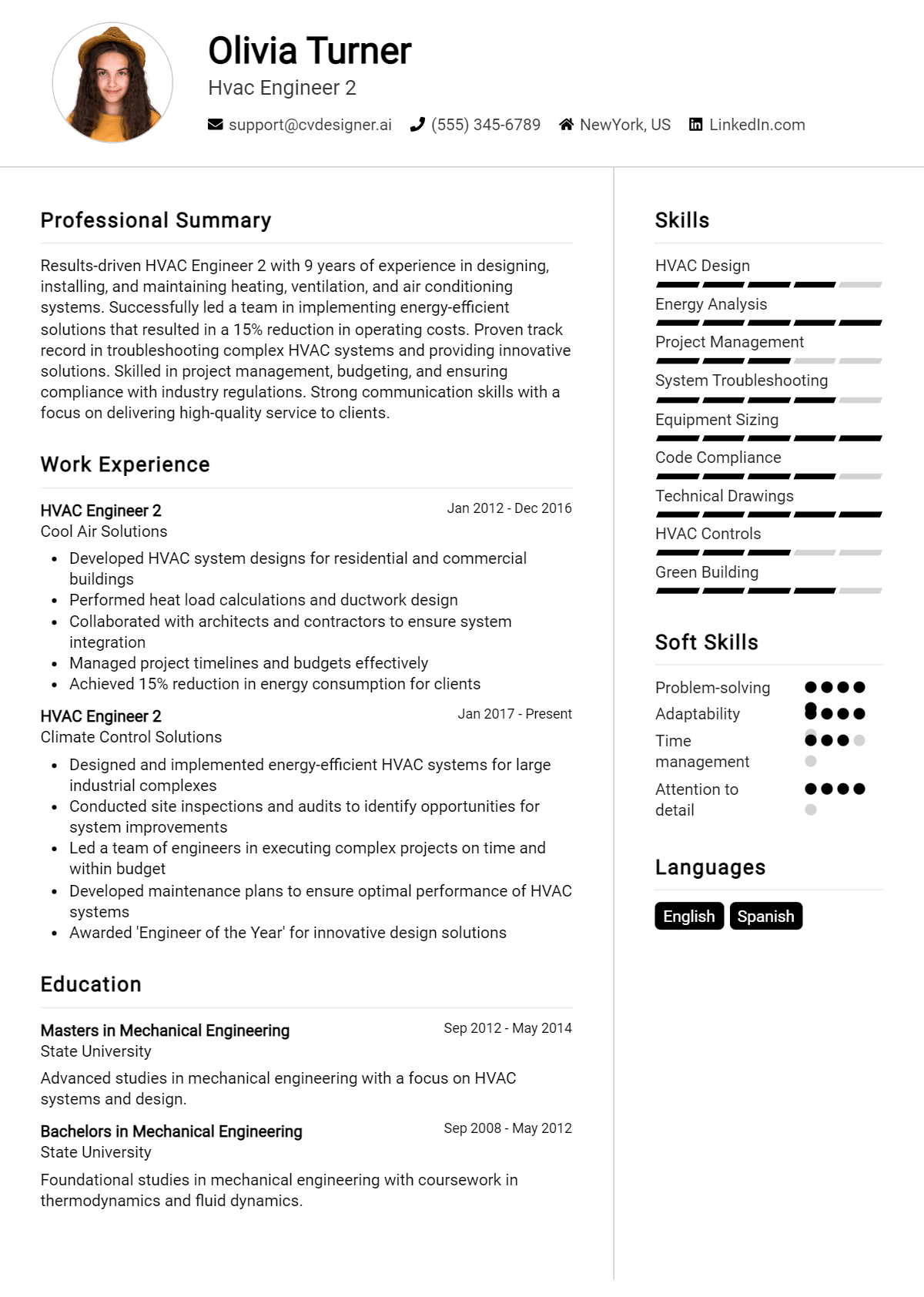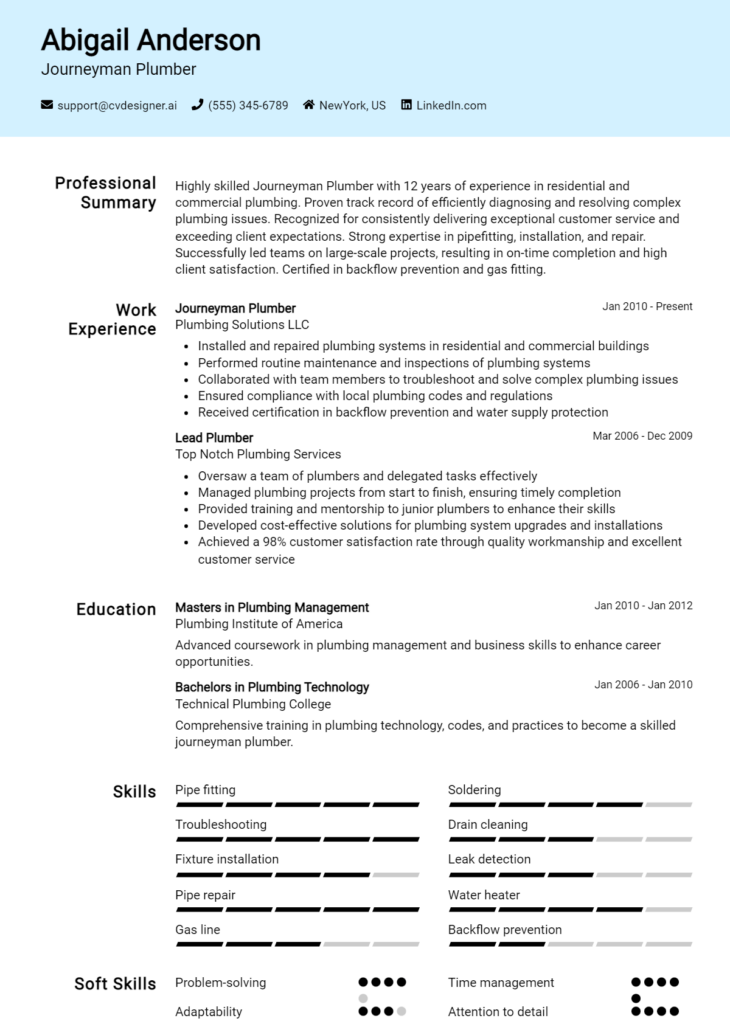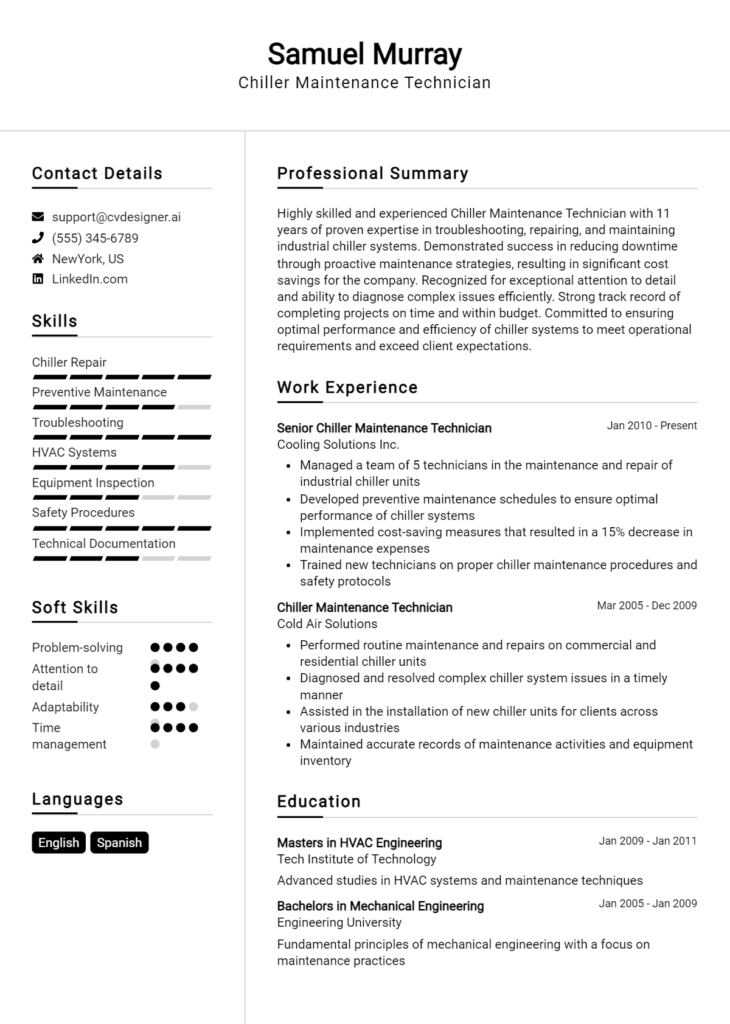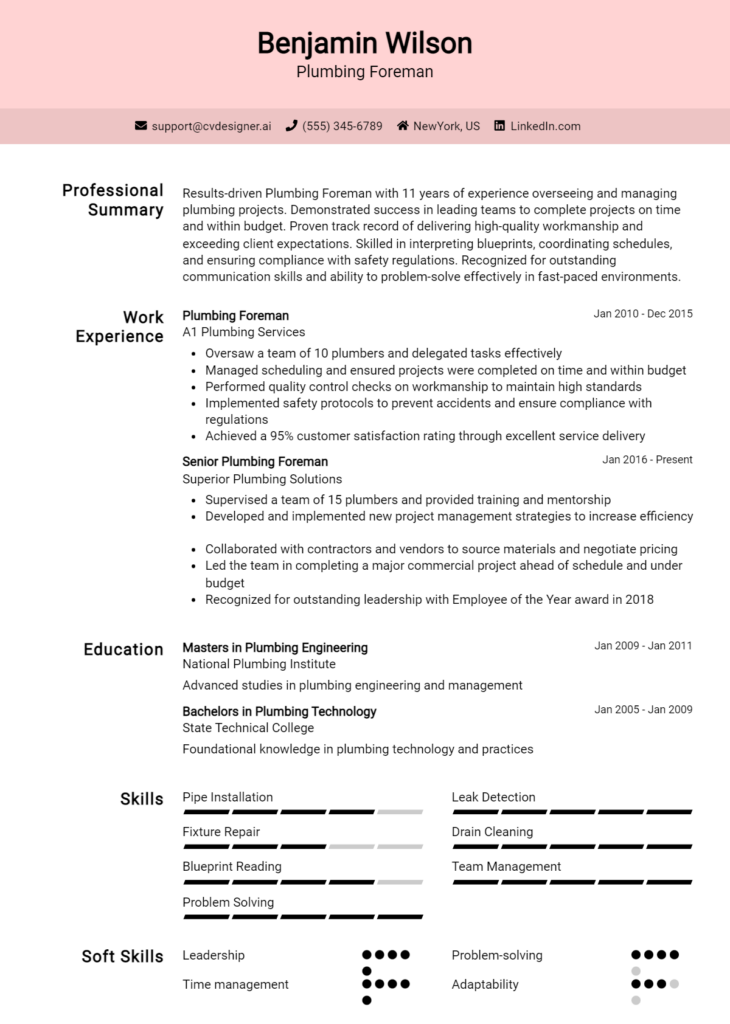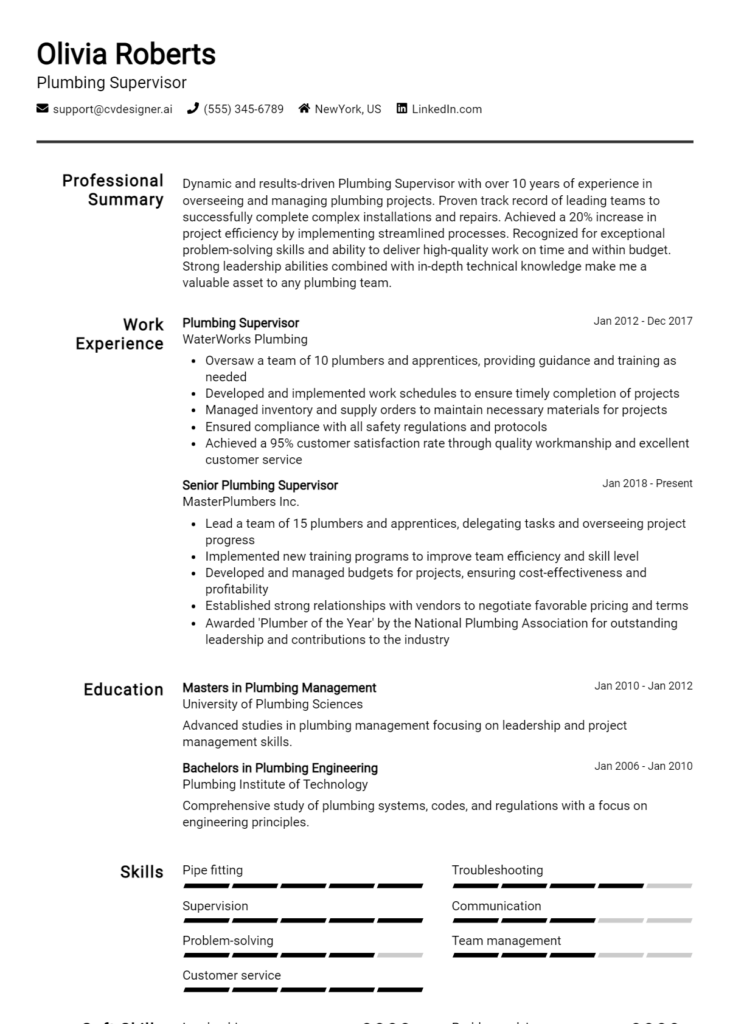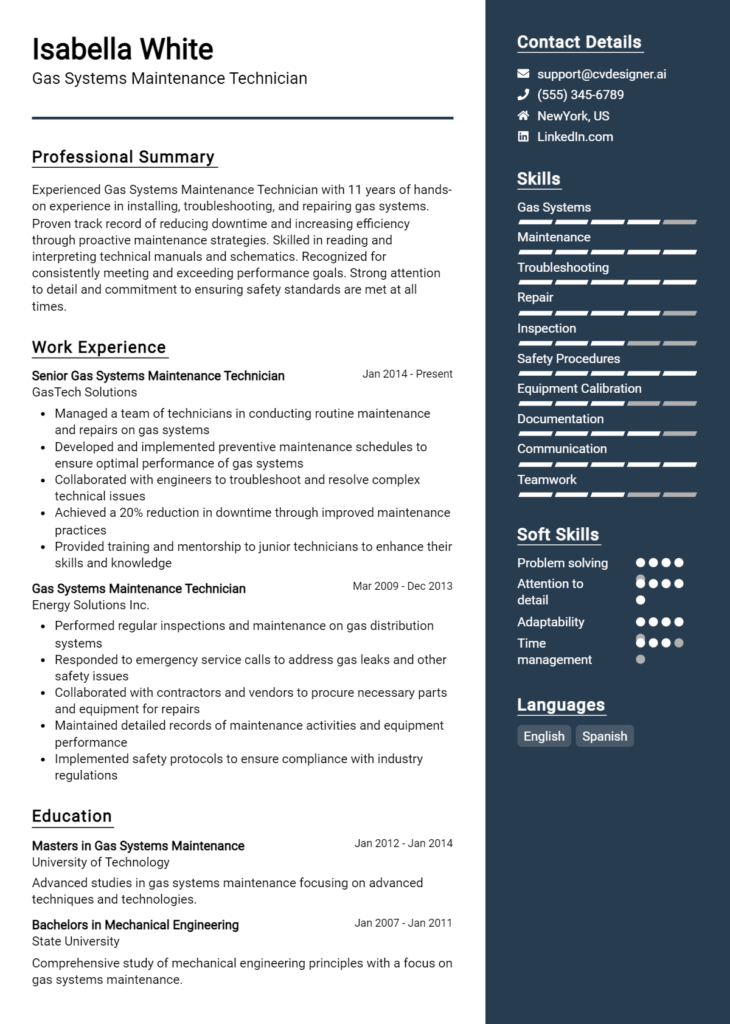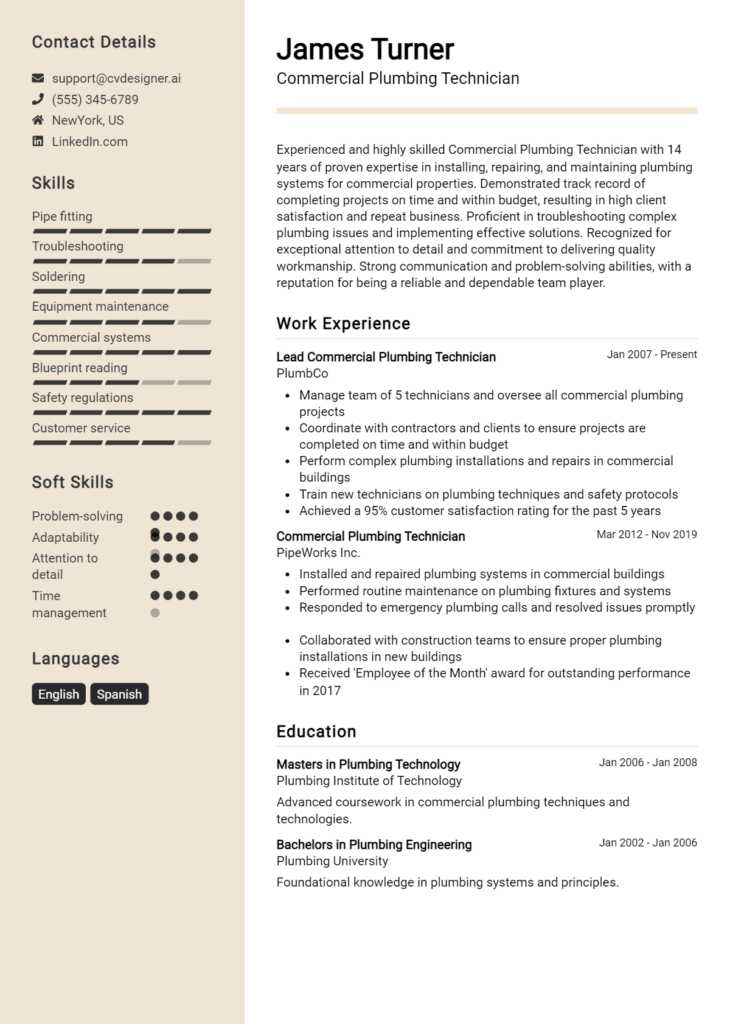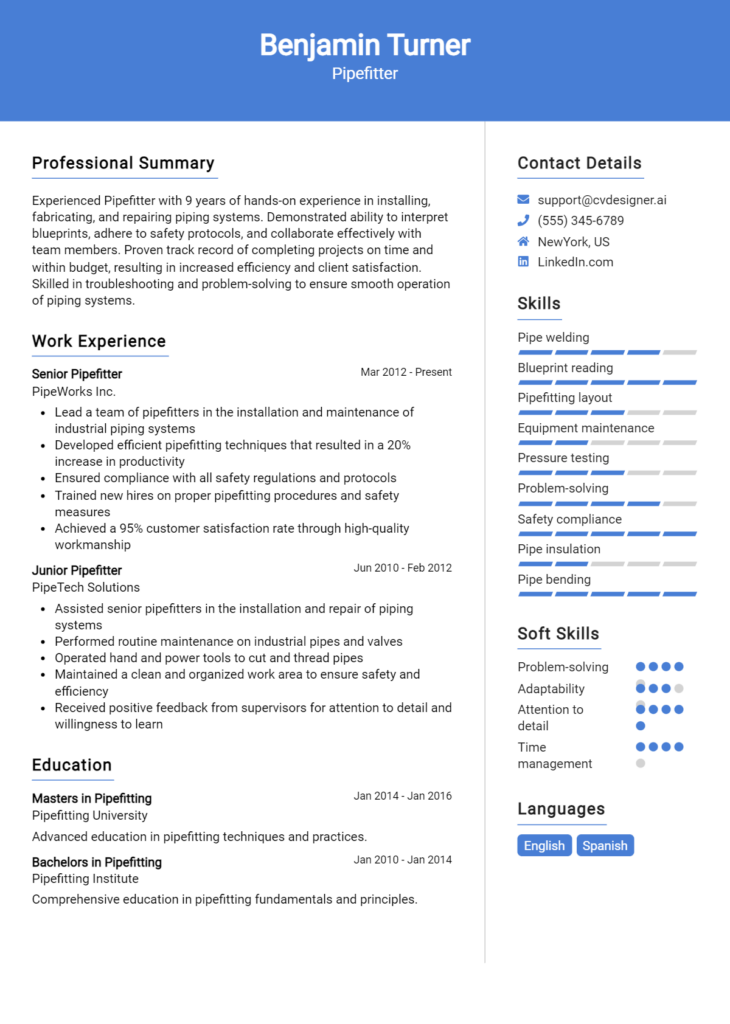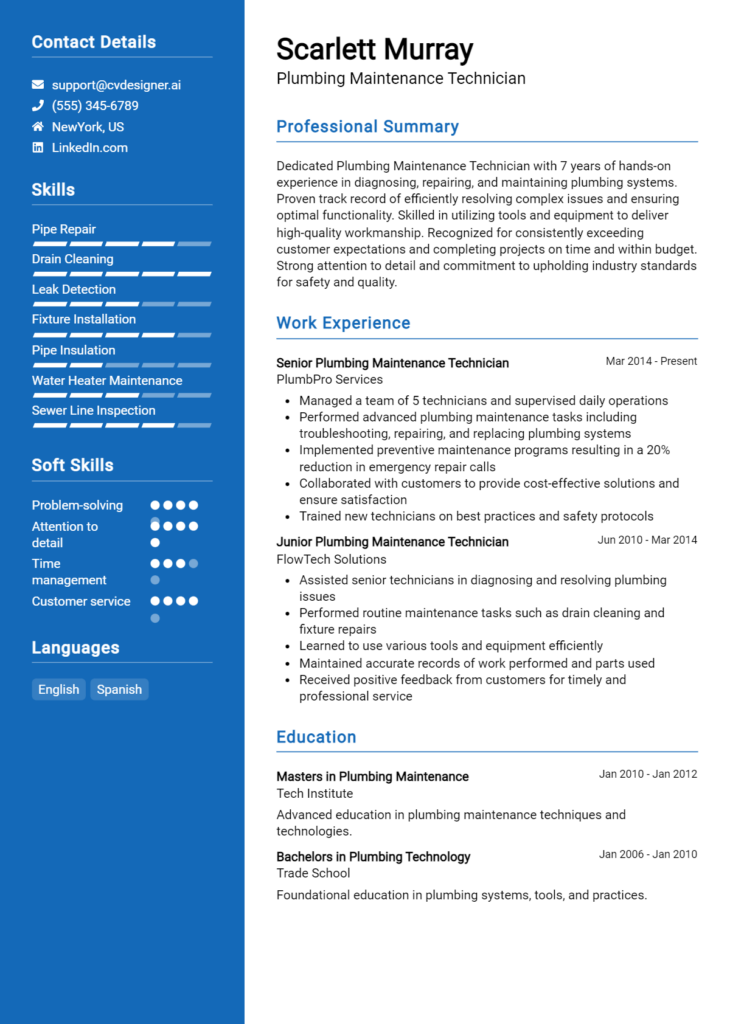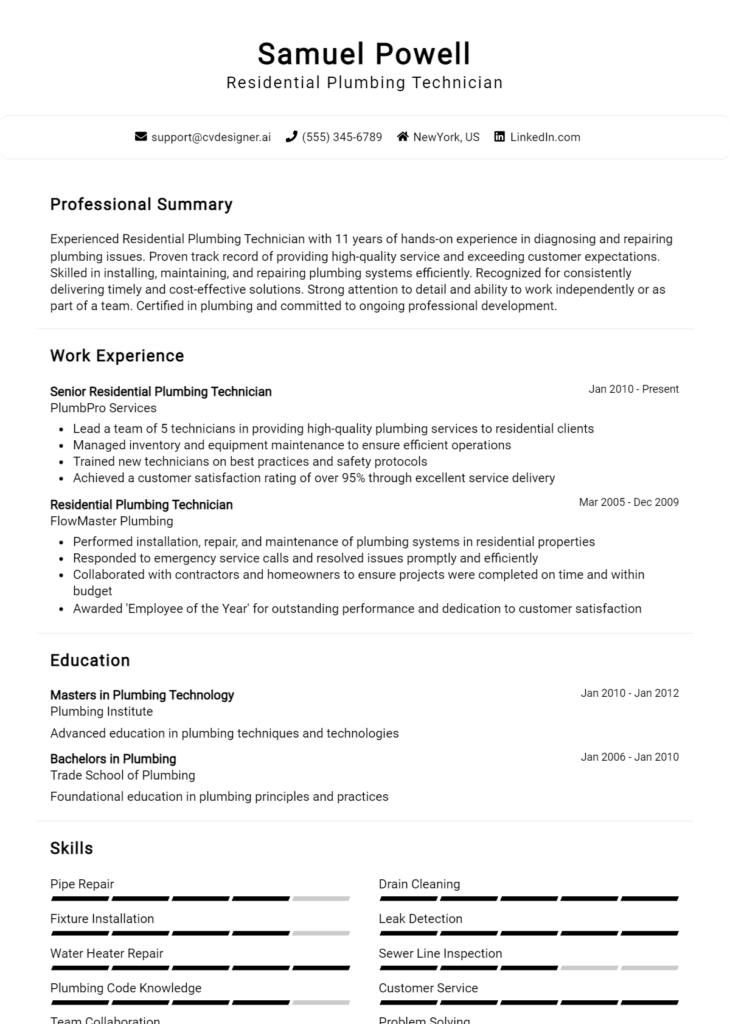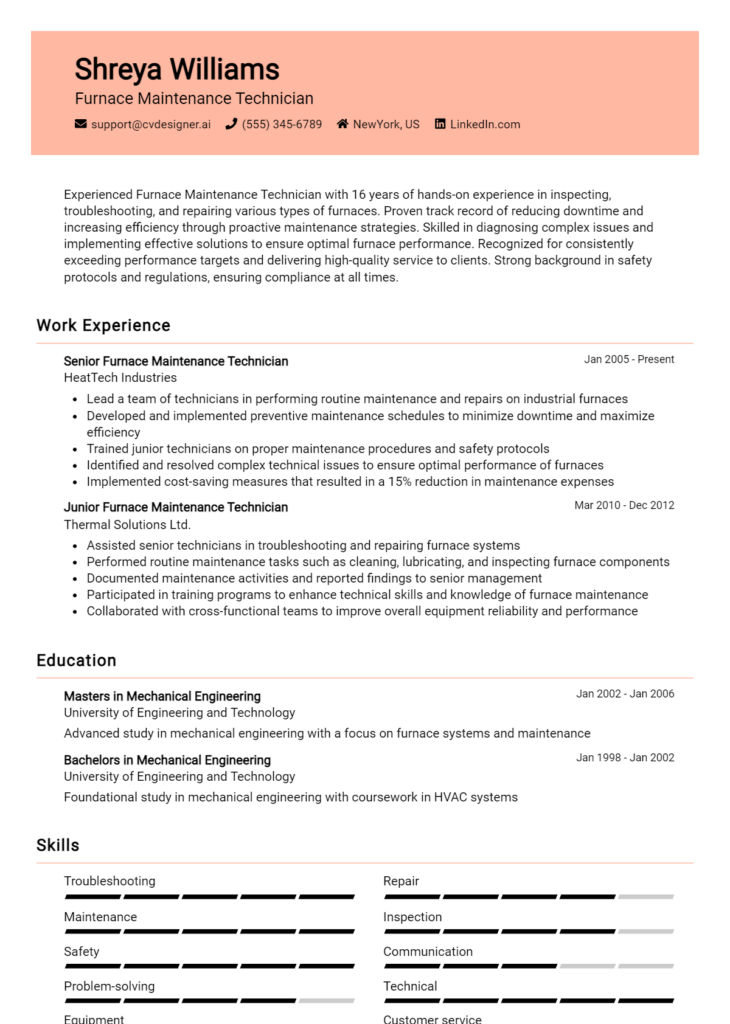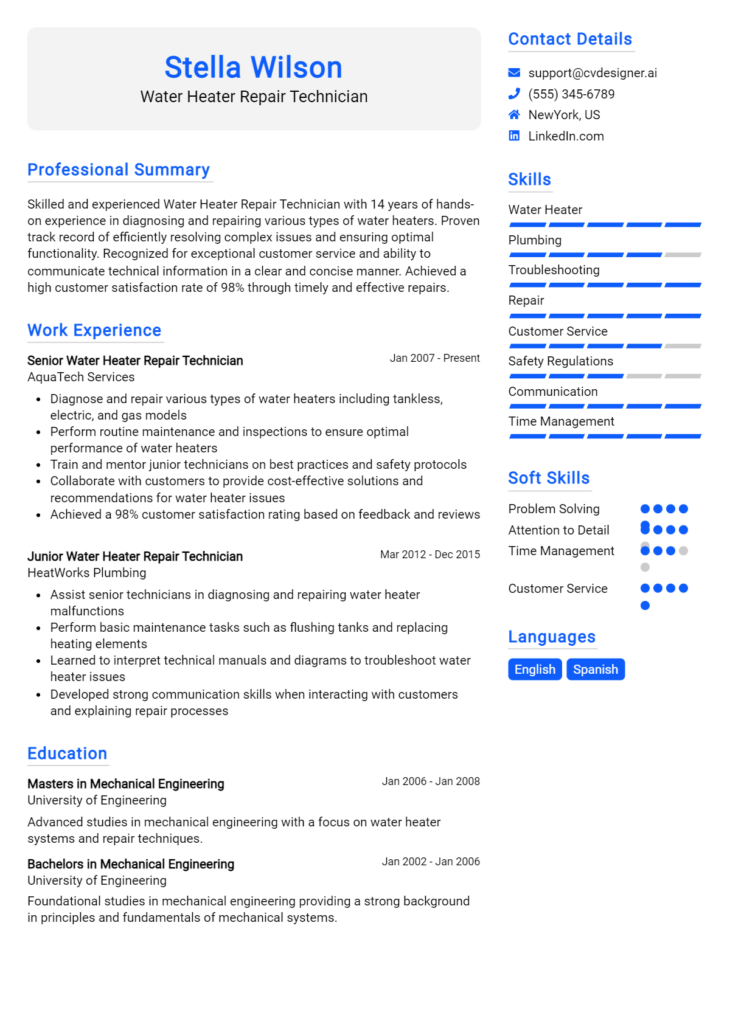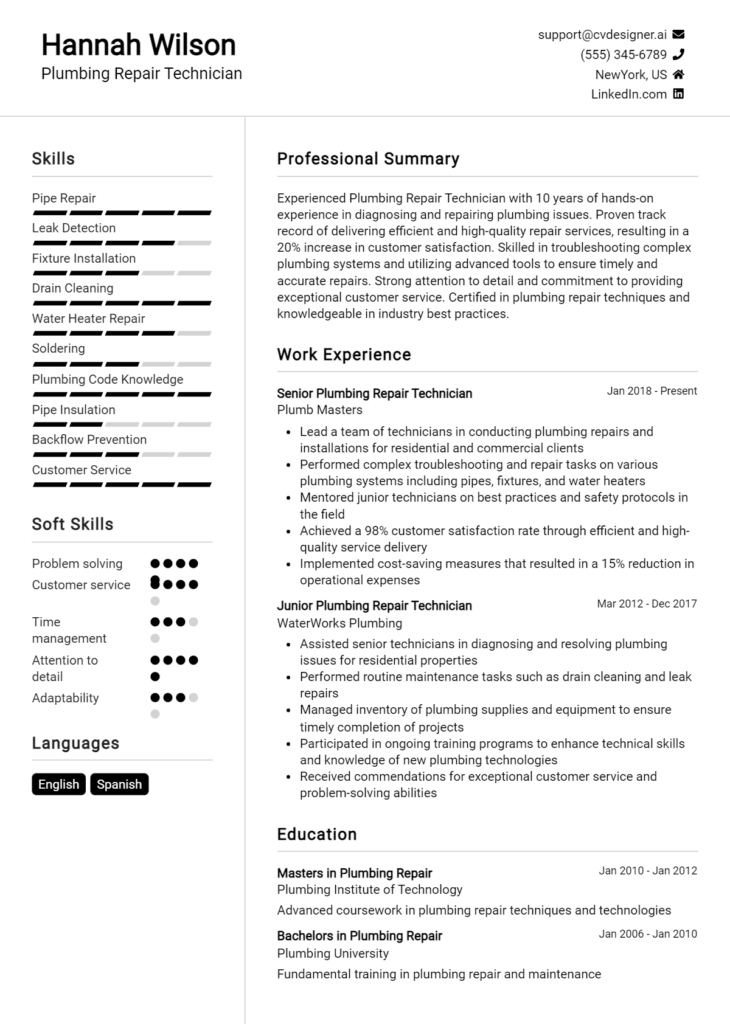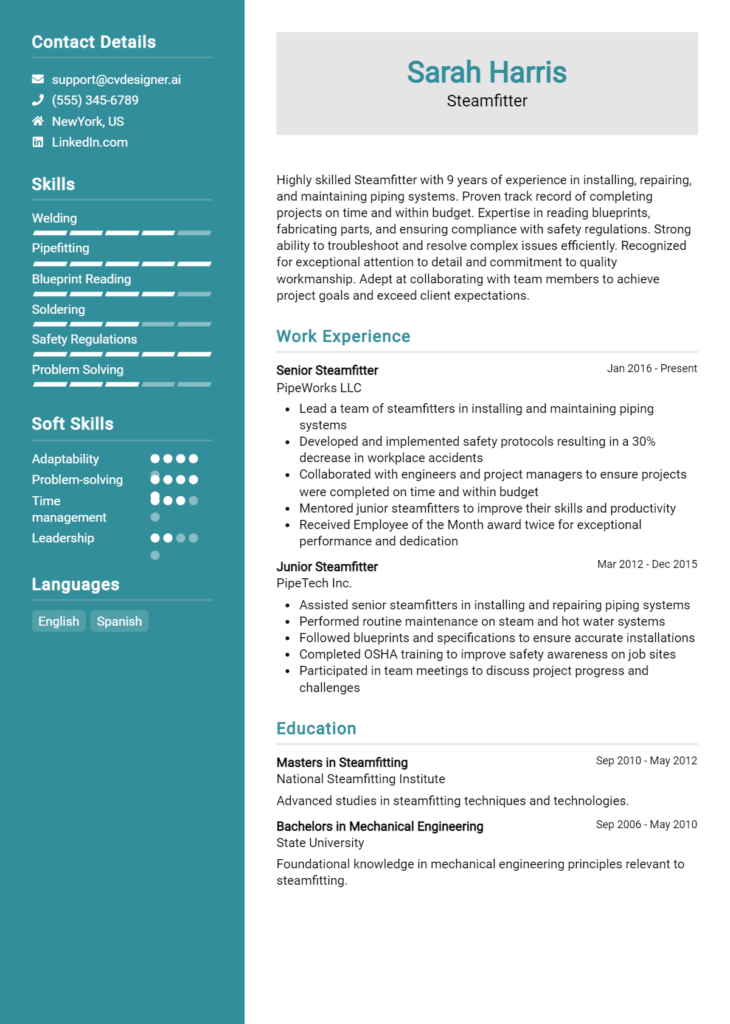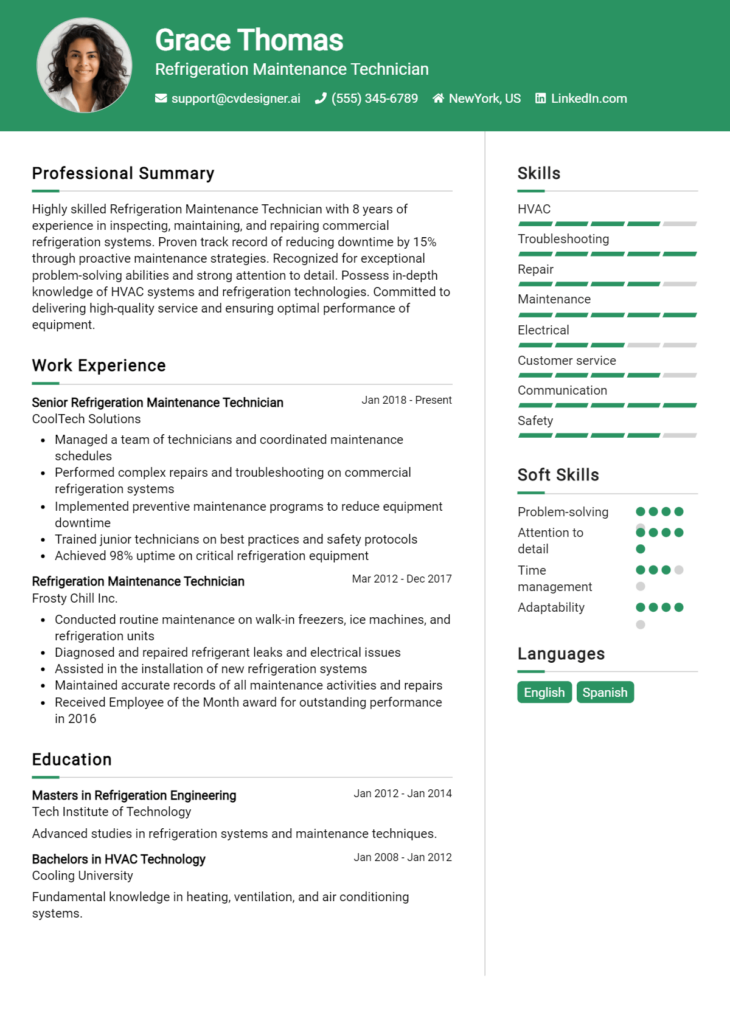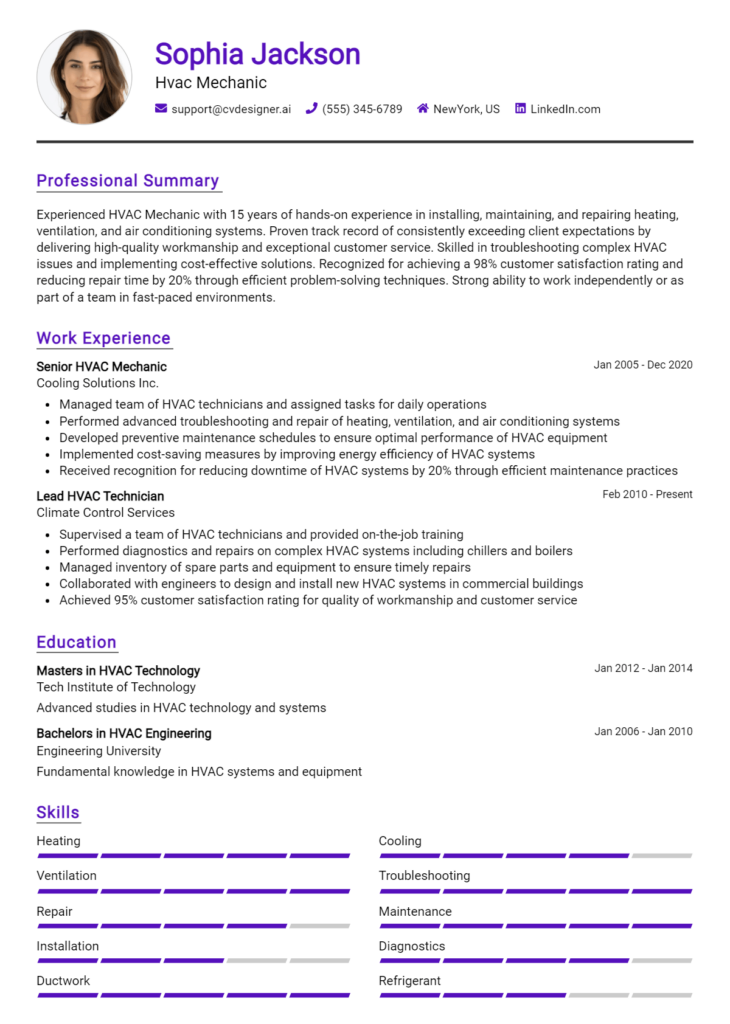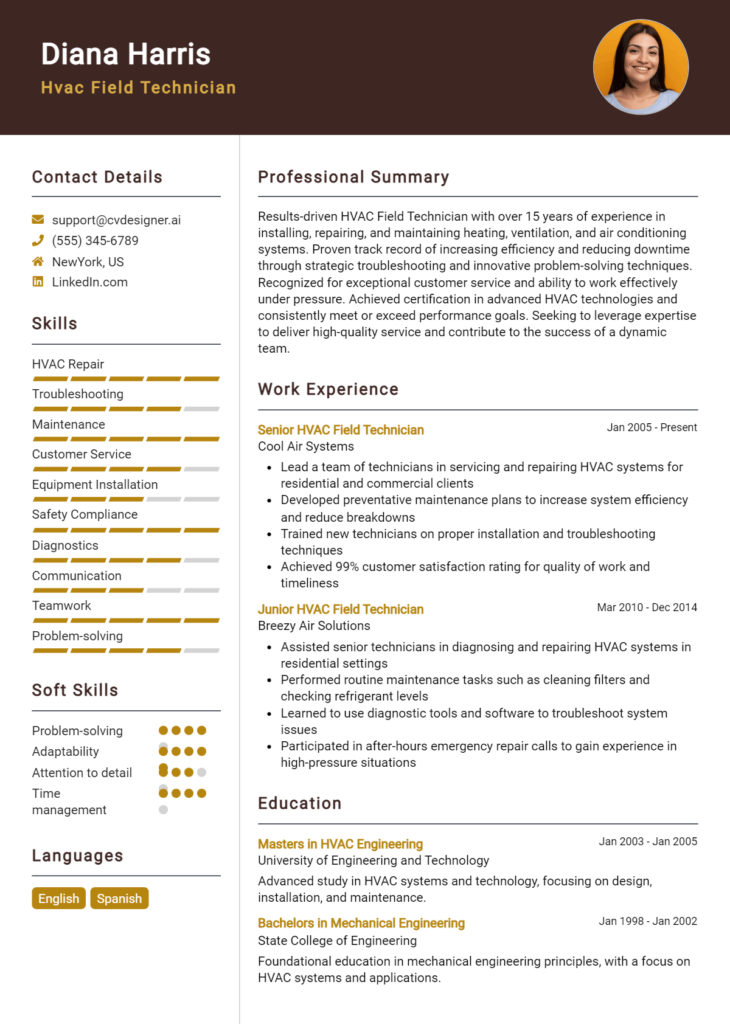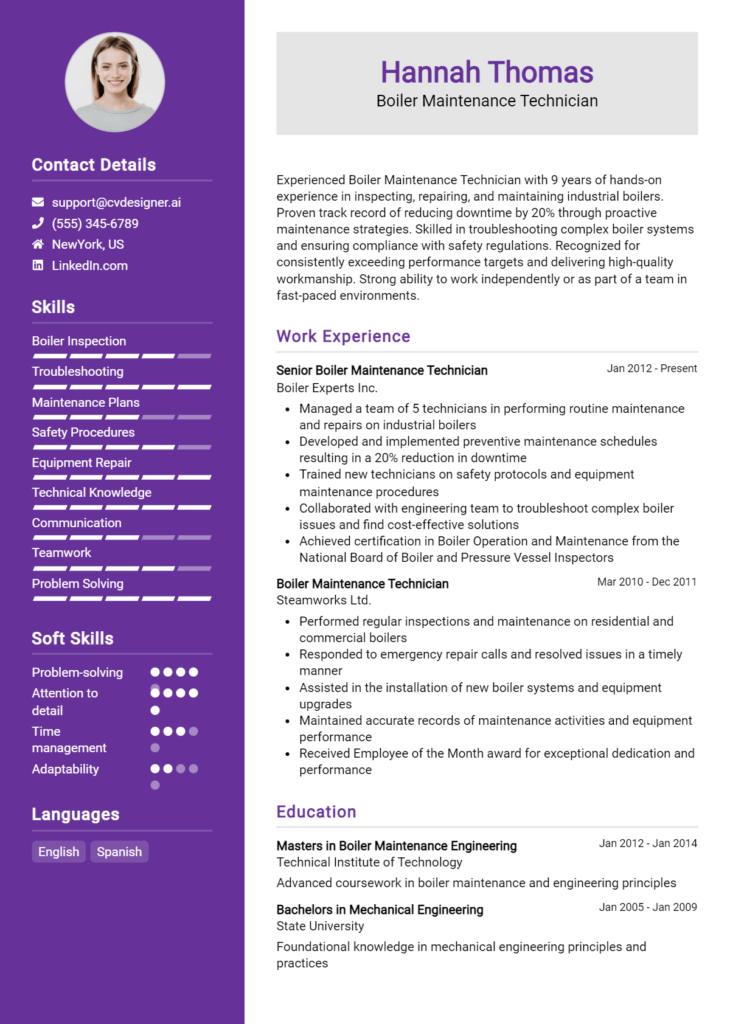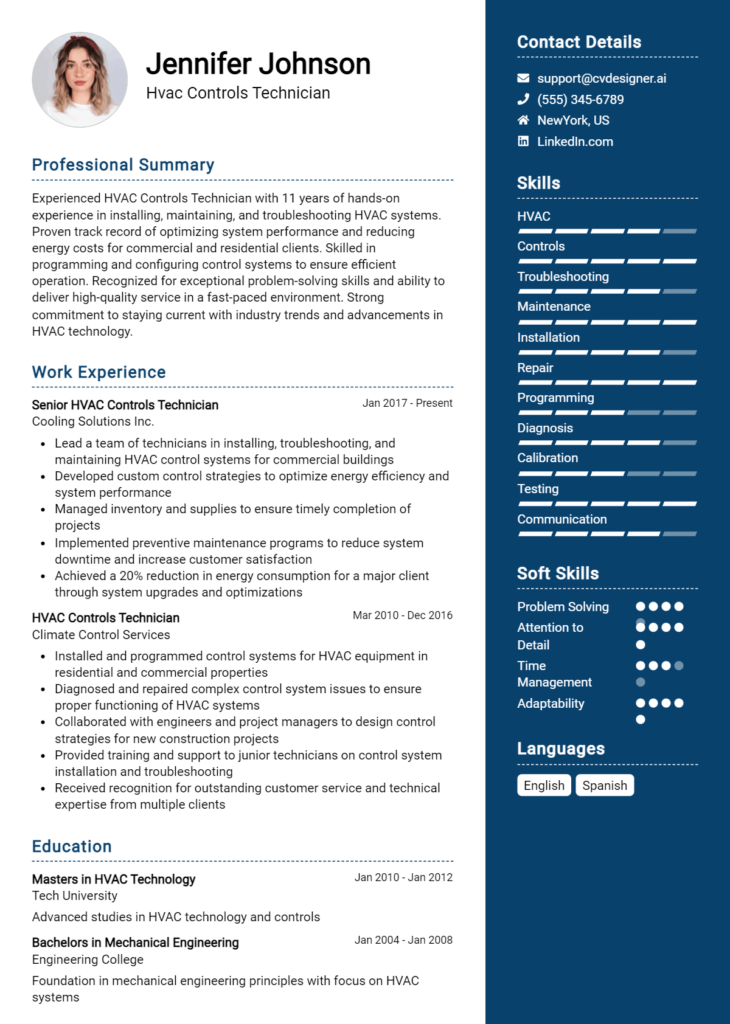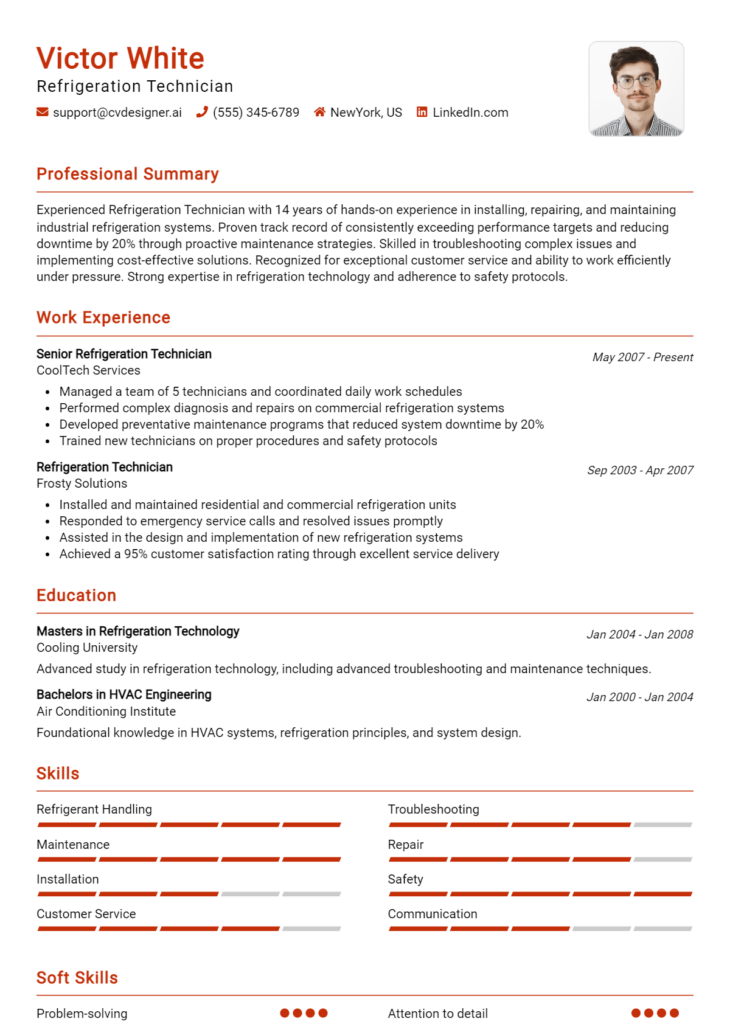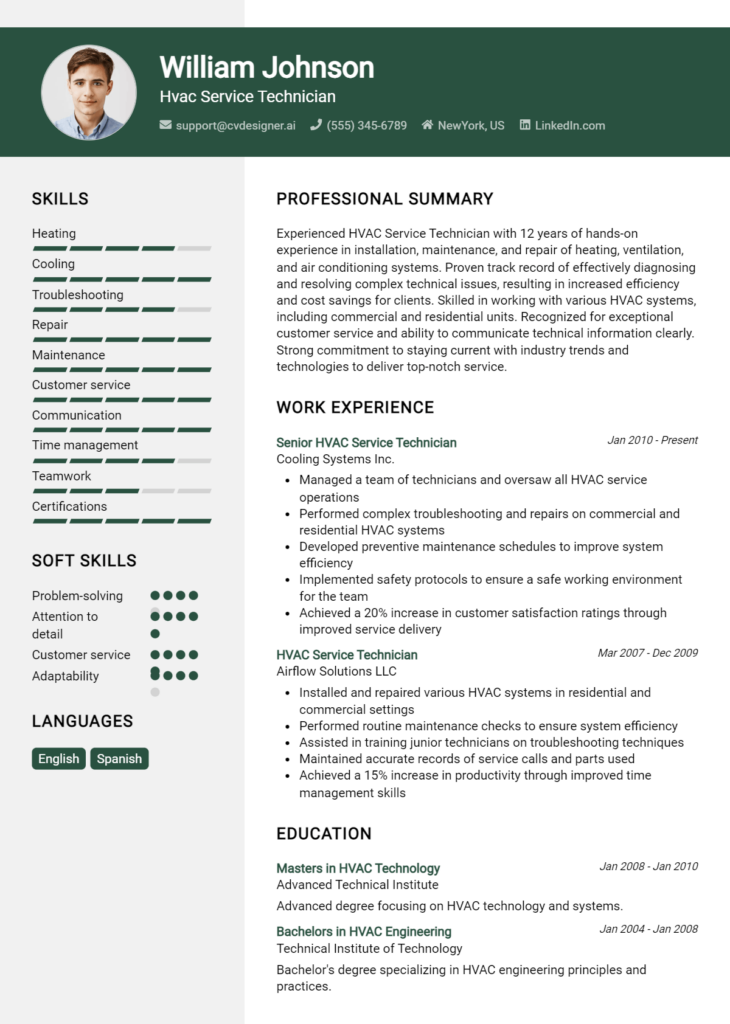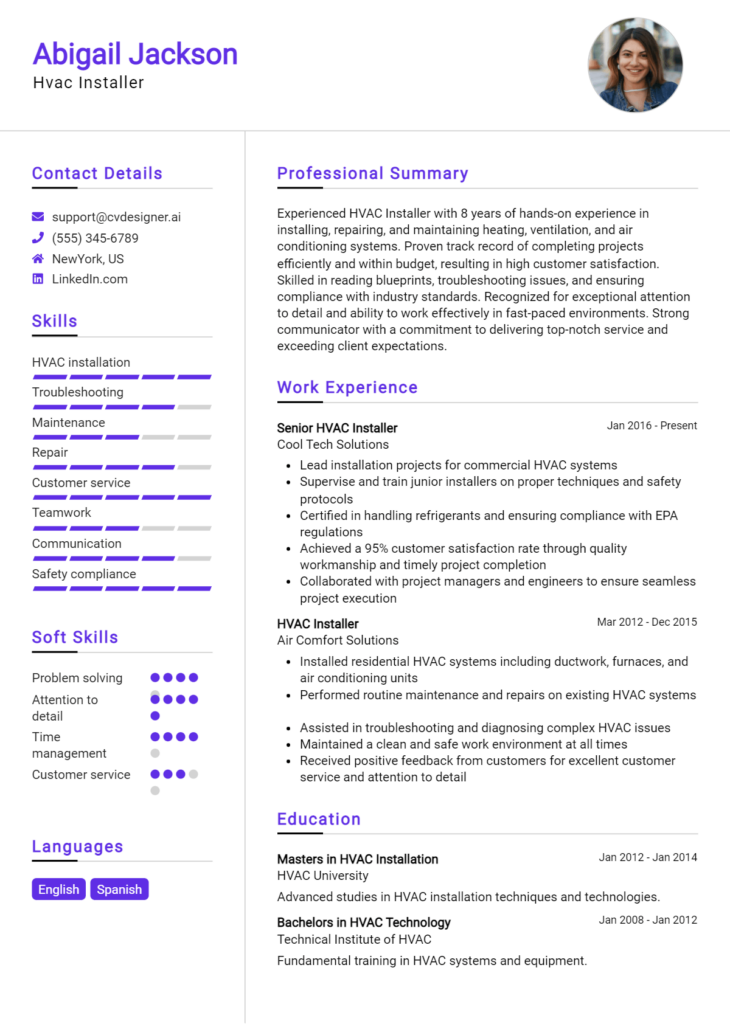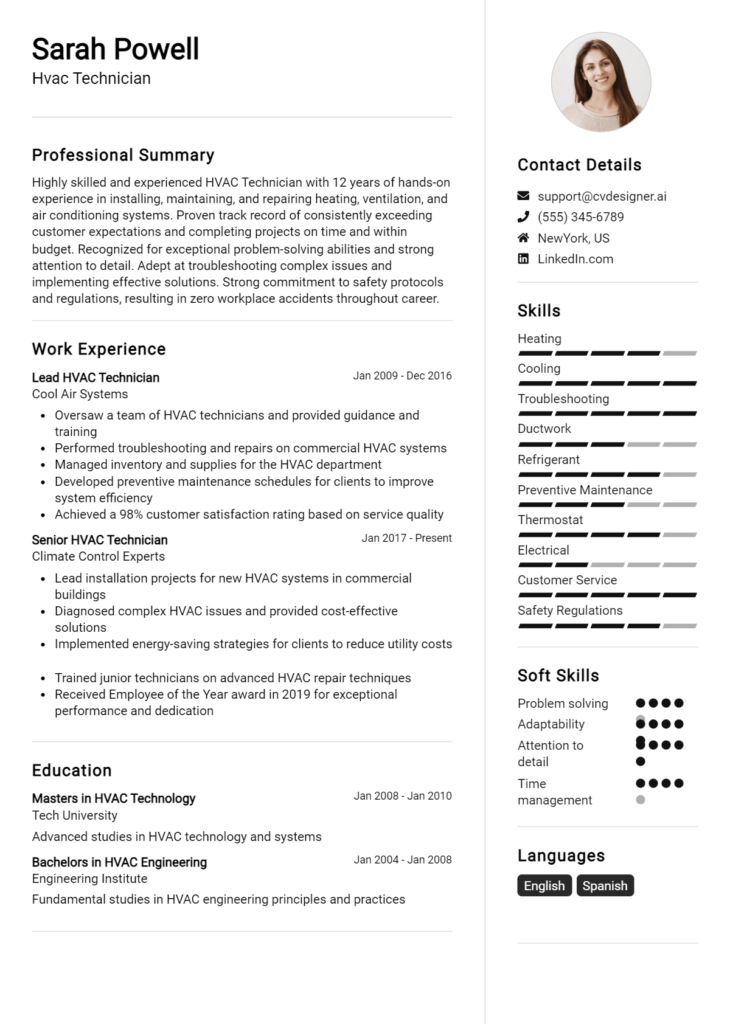HVAC Engineer Core Responsibilities
An HVAC Engineer plays a crucial role in designing, installing, and maintaining heating, ventilation, and air conditioning systems. This position requires strong technical and operational skills, as well as problem-solving abilities to ensure efficient system performance. HVAC Engineers collaborate with various departments, including construction, maintenance, and energy management, to meet organizational goals. A well-structured resume showcasing these qualifications, such as project management and system analysis, can significantly enhance career prospects in this field.
Common Responsibilities Listed on HVAC Engineer Resume
- Design and implement HVAC systems to meet project specifications.
- Conduct energy audits and system assessments for optimization.
- Prepare technical documentation and project reports.
- Collaborate with architects and contractors for system integration.
- Oversee installation and commissioning of HVAC equipment.
- Ensure compliance with local building codes and regulations.
- Perform troubleshooting and maintenance on HVAC systems.
- Manage project budgets and timelines effectively.
- Evaluate and recommend energy-efficient solutions.
- Provide technical support and training for maintenance staff.
- Monitor system performance and recommend improvements.
High-Level Resume Tips for HVAC Engineer Professionals
In the competitive field of HVAC engineering, a well-crafted resume is essential for capturing the attention of potential employers. As the first impression a candidate makes, it is crucial that the resume not only highlights technical skills and certifications but also effectively showcases professional achievements and hands-on experience. A strong resume can open doors to interviews and ultimately lead to exciting career opportunities. This guide will provide practical and actionable resume tips specifically tailored for HVAC Engineer professionals, ensuring that your resume stands out in a crowded job market.
Top Resume Tips for HVAC Engineer Professionals
- Tailor your resume to match the job description, using keywords and phrases relevant to the specific HVAC position.
- Highlight your technical skills, such as system design, troubleshooting, and proficiency with HVAC software.
- Showcase relevant work experience, detailing specific projects and your role in their success.
- Quantify your achievements by including metrics, such as energy savings, project completion times, or cost reductions.
- Include certifications and licenses, such as EPA certification or NATE certification, to demonstrate your qualifications.
- Emphasize soft skills, such as teamwork, communication, and problem-solving abilities, which are critical in client-facing roles.
- Use a clear and professional format with consistent fonts and spacing to enhance readability.
- Consider including a summary statement that encapsulates your experience and career goals in a concise manner.
- Keep your resume to one or two pages, ensuring that every word adds value to your application.
By implementing these resume tips, HVAC Engineer professionals can significantly increase their chances of landing a job in the field. A focused and polished resume not only highlights your technical expertise but also presents you as a well-rounded candidate capable of contributing to the success of any HVAC project.
Why Resume Headlines & Titles are Important for HVAC Engineer
In the competitive field of HVAC engineering, a well-crafted resume is essential for standing out among a sea of applicants. Resume headlines and titles serve a pivotal role in this process, as they are often the first thing hiring managers notice. A strong headline can instantly grab attention and convey a candidate's key qualifications in a concise, impactful manner. This brief but powerful phrase should be relevant to the specific job being applied for, encapsulating the candidate’s skills, experience, and professional identity in a way that resonates with potential employers.
Best Practices for Crafting Resume Headlines for HVAC Engineer
- Keep it concise: Aim for a headline that is no longer than 10-12 words.
- Make it role-specific: Tailor the headline to reflect the HVAC engineering position you are applying for.
- Highlight key skills: Include one or two of your top technical skills relevant to HVAC engineering.
- Use action-oriented language: Start with strong verbs to convey your proactive approach.
- Showcase certifications: If applicable, mention any relevant engineering licenses or certifications.
- Quantify accomplishments: Whenever possible, include specific achievements that demonstrate your impact.
- Be authentic: Ensure that the headline accurately represents your professional brand and personality.
- Stay professional: Avoid jargon or overly casual language that may detract from your credibility.
Example Resume Headlines for HVAC Engineer
Strong Resume Headlines
Innovative HVAC Engineer with 10+ Years of Experience in Energy Efficiency Solutions
Certified HVAC Technician Specializing in System Design and Installation
Results-Driven HVAC Engineer Focused on Sustainable Building Practices
Experienced HVAC Project Manager with Proven Record of Delivering Complex Projects On Time
Weak Resume Headlines
Seeking HVAC Engineer Position
HVAC Engineer with Some Experience
Strong resume headlines effectively capture the essence of a candidate’s expertise and achievements, making them memorable and appealing to hiring managers. They convey specific skills and accomplishments, helping to differentiate candidates in a crowded field. In contrast, weak headlines lack clarity and specificity, failing to provide any insight into the candidate's qualifications or unique value proposition. As such, they are unlikely to leave a lasting impression on potential employers.
Writing an Exceptional HVAC Engineer Resume Summary
An exceptional resume summary is critical for HVAC Engineers as it serves as the first impression to hiring managers. A well-crafted summary quickly captures attention by highlighting key skills, relevant experience, and notable accomplishments that align with the job role. It should be concise and impactful, tailored specifically to the job the candidate is applying for, effectively communicating their value proposition and setting the stage for the rest of the resume.
Best Practices for Writing a HVAC Engineer Resume Summary
- Quantify Achievements: Use numbers and metrics to demonstrate the impact of your work.
- Focus on Relevant Skills: Highlight technical skills and certifications that are pertinent to the HVAC industry.
- Tailor for the Job Description: Customize your summary to reflect the specific requirements and responsibilities mentioned in the job listing.
- Be Concise: Aim for 3-4 sentences that succinctly convey your qualifications without unnecessary fluff.
- Showcase Problem Solving: Mention specific challenges you have overcome and how your solutions benefited past employers.
- Highlight Industry Experience: Include years of experience and any specialized knowledge related to HVAC systems.
- Use Action Verbs: Start sentences with strong action verbs that convey your proactive approach.
- Maintain Professional Tone: Keep the language formal and avoid overly casual phrases to maintain professionalism.
Example HVAC Engineer Resume Summaries
Strong Resume Summaries
Results-driven HVAC Engineer with over 8 years of experience in designing and implementing energy-efficient heating and cooling systems. Successfully reduced energy costs by 25% for multiple commercial clients through innovative system designs and rigorous project management.
Detail-oriented HVAC Engineer skilled in system diagnostics and troubleshooting, with a proven track record of enhancing system performance. Managed a team that completed over 50 HVAC installations ahead of schedule, resulting in a 15% increase in client satisfaction ratings.
Licensed HVAC Engineer with expertise in sustainable design practices and building automation systems. Led a project that achieved LEED certification for a major commercial property, contributing to a 30% reduction in overall energy consumption.
Weak Resume Summaries
Experienced HVAC Engineer looking for new opportunities. I have worked on various projects and am knowledgeable about HVAC systems.
HVAC professional with a good understanding of heating and cooling systems. I am eager to apply my skills in a challenging role.
The examples provided illustrate the difference between strong and weak resume summaries. Strong summaries effectively quantify achievements, showcase relevant skills, and convey specific accomplishments that directly relate to the HVAC Engineer role. In contrast, weak summaries are vague and lack measurable outcomes, making them less impactful and memorable to hiring managers.
Work Experience Section for HVAC Engineer Resume
The work experience section of an HVAC Engineer resume is pivotal in demonstrating a candidate's technical skills, project management capabilities, and commitment to delivering high-quality results. This section provides potential employers with tangible evidence of how the applicant has applied their expertise in real-world scenarios, effectively managing teams and contributing to the successful execution of HVAC projects. Quantifying achievements, such as energy savings, project budgets, and timelines, while aligning experience with industry standards is essential for making a strong impression and showcasing the candidate's value to prospective employers.
Best Practices for HVAC Engineer Work Experience
- Highlight specific technical skills relevant to HVAC systems, such as design, installation, and maintenance.
- Quantify achievements, using metrics like energy efficiency improvements, cost savings, or project completion timelines.
- Emphasize collaborative projects where you worked with cross-functional teams, showcasing your teamwork abilities.
- Use action verbs to convey responsibility and initiative in each role.
- Tailor your work experience to align with the job description, focusing on the most relevant experiences.
- Include certifications and specialized training that enhance your technical credibility.
- Showcase leadership roles or responsibilities, particularly in managing teams or overseeing projects.
- Keep descriptions concise and focused on results, avoiding overly technical jargon that might not resonate with all readers.
Example Work Experiences for HVAC Engineer
Strong Experiences
- Led a team of 5 engineers in the design and implementation of a commercial HVAC system that reduced energy costs by 30% annually.
- Managed the installation of a state-of-the-art HVAC system in a 200,000 sq. ft. facility, completing the project 2 weeks ahead of schedule and under budget by 15%.
- Collaborated with architects and contractors on a high-rise building project, ensuring HVAC designs met LEED certification requirements, contributing to a 40% reduction in carbon footprint.
- Conducted performance audits on existing HVAC systems, resulting in an overall efficiency improvement of 20% across multiple sites through targeted upgrades.
Weak Experiences
- Worked on HVAC projects with some team members and addressed issues as they arose.
- Assisted in the installation of HVAC systems in various buildings.
- Participated in meetings regarding HVAC system performance without clear outcomes.
- Supported senior engineers in resolving HVAC-related problems occasionally.
The experiences listed under "Strong Experiences" are considered strong because they provide specific, quantifiable results and demonstrate leadership and collaboration, showcasing the candidate's ability to achieve significant outcomes. In contrast, the "Weak Experiences" lack detail and measurable results, making them less impactful and failing to convey the candidate's true capabilities and contributions to past projects.
Education and Certifications Section for HVAC Engineer Resume
The education and certifications section of an HVAC Engineer resume is crucial in demonstrating the candidate's academic foundation and commitment to the field. This section not only highlights relevant degrees and industry-recognized certifications but also showcases the candidate's dedication to continuous learning and professional development. Including pertinent coursework, specialized training, and up-to-date certifications can significantly enhance a candidate's credibility, illustrating alignment with the job requirements and the ability to stay current in a rapidly evolving industry.
Best Practices for HVAC Engineer Education and Certifications
- Include only relevant degrees and certifications that pertain to HVAC engineering.
- List certifications in order of relevance, prioritizing those recognized by industry associations.
- Provide details on specialized training or workshops attended to showcase continued education.
- Incorporate specific coursework that directly relates to HVAC systems, design, and energy efficiency.
- Highlight advanced degrees or certifications that demonstrate a higher level of expertise.
- Use clear headings and bullet points for easy readability to draw attention to key qualifications.
- Keep information up-to-date, removing any outdated or irrelevant credentials.
- Consider including professional affiliations that can further validate industry involvement.
Example Education and Certifications for HVAC Engineer
Strong Examples
- Bachelor of Science in Mechanical Engineering, University of XYZ, 2018
- Certified HVAC Technician (NATE), 2021
- LEED Green Associate Certification, 2020
- Coursework in Thermodynamics and Fluid Mechanics, University of XYZ
Weak Examples
- Associate Degree in General Studies, Community College of ABC, 2010
- Certification in Basic Electrical Skills, 2015
- High School Diploma, 2008
- Outdated certification in R-22 Refrigerant Handling, 2016
The examples provided are considered strong because they directly align with the requirements of an HVAC Engineer, showcasing relevant degrees and industry-recognized certifications that reflect current knowledge and skills. In contrast, the weak examples illustrate qualifications that are either outdated, irrelevant, or do not adequately represent the candidate's expertise in HVAC engineering, which could detract from their overall qualifications for the role.
Top Skills & Keywords for HVAC Engineer Resume
As an HVAC Engineer, showcasing the right skills on your resume is crucial to stand out in a competitive job market. Employers seek candidates who not only possess technical knowledge but also demonstrate strong interpersonal abilities. Highlighting a combination of hard and soft skills can effectively convey your qualifications and adaptability to potential employers. By focusing on relevant skills, you can increase your chances of landing an interview and advancing your career in the HVAC industry. For a comprehensive overview of how to effectively present your skills and work experience, it’s essential to tailor your resume to align with the specific demands of the role.
Top Hard & Soft Skills for HVAC Engineer
Soft Skills
- Problem-solving
- Communication skills
- Teamwork and collaboration
- Attention to detail
- Time management
- Customer service orientation
- Adaptability
- Critical thinking
- Project management
- Leadership skills
Hard Skills
- HVAC system design and installation
- Knowledge of building codes and regulations
- Energy management systems (EMS)
- Proficiency in HVAC software (e.g., AutoCAD, Revit)
- Refrigeration principles
- HVAC control systems
- Troubleshooting and repair
- Ductwork design and analysis
- Indoor air quality assessments
- Load calculations and energy audits
Stand Out with a Winning HVAC Engineer Cover Letter
I am writing to express my interest in the HVAC Engineer position at [Company Name] as advertised on [where you found the job listing]. With a solid foundation in mechanical engineering and over [X years] of experience in designing, implementing, and maintaining HVAC systems, I am confident in my ability to contribute effectively to your team. My passion for energy-efficient solutions and commitment to enhancing indoor air quality aligns perfectly with [Company Name]'s mission to provide innovative HVAC solutions.
Throughout my career, I have successfully managed multiple projects, from initial design to final installation, ensuring compliance with all relevant regulations and standards. My role at [Previous Company] allowed me to lead a team in the redesign of an outdated HVAC system for a commercial facility, which resulted in a 30% reduction in energy costs while improving overall system performance. I am proficient in using industry-standard software such as AutoCAD and Revit, which enables me to create detailed designs and simulations that meet the specific needs of clients.
In addition to my technical skills, I pride myself on my ability to communicate effectively with clients and team members alike. I believe that a successful HVAC project relies on collaboration and understanding client needs, which I prioritize in all my interactions. My strong problem-solving abilities and attention to detail allow me to troubleshoot issues quickly and implement solutions that keep projects on track and within budget. I am excited about the opportunity to bring my expertise to [Company Name] and contribute to innovative projects that make a real difference in energy efficiency and sustainability.
Thank you for considering my application. I look forward to the possibility of discussing how my experience and skills can benefit your team and help [Company Name] continue to excel in the HVAC industry. Please feel free to contact me at your earliest convenience to schedule a conversation.
Common Mistakes to Avoid in a HVAC Engineer Resume
When applying for a position as an HVAC Engineer, your resume serves as a critical first impression. A well-crafted resume can significantly enhance your chances of landing an interview, while common mistakes can hinder your prospects. Understanding these pitfalls can help you create a compelling document that showcases your skills and qualifications effectively. Here are some common mistakes to avoid in your HVAC Engineer resume:
Generic Objective Statement: Using a one-size-fits-all objective fails to personalize your resume and does not highlight your specific goals or the value you can bring to the employer. Tailor this section to the job you are applying for.
Lack of Relevant Keywords: Many companies use Applicant Tracking Systems (ATS) to filter resumes. Failing to include industry-specific keywords can result in your resume being overlooked. Make sure to incorporate terminology from the job description.
Overloading with Technical Jargon: While technical expertise is essential, using too much jargon can alienate readers. Balance your technical language with clear explanations to ensure your resume is accessible to hiring managers.
Neglecting Achievements: Simply listing job duties does not demonstrate your impact. Showcase your achievements with quantifiable results, such as energy savings or project completion rates, to illustrate your effectiveness.
Poor Formatting: A cluttered or inconsistent layout can make your resume difficult to read. Use clear headings, bullet points, and consistent font styles to enhance readability and professionalism.
Ignoring Soft Skills: While technical skills are crucial, soft skills such as communication, teamwork, and problem-solving are equally important in HVAC roles. Highlight these skills to present yourself as a well-rounded candidate.
Omitting Certifications and Licenses: HVAC Engineers often require specific certifications and licenses to practice. Ensure these are prominently displayed on your resume to demonstrate compliance with industry standards.
Failing to Proofread: Grammatical errors or typos can create a negative impression and suggest a lack of attention to detail. Always proofread your resume or have someone else review it before submission.
Conclusion
In conclusion, the role of an HVAC Engineer is crucial in ensuring that heating, ventilation, and air conditioning systems operate efficiently and effectively. Throughout this article, we discussed the essential skills needed for HVAC engineers, including technical proficiency, problem-solving abilities, and knowledge of industry standards. We also highlighted the importance of certifications and continuous education in staying updated with the latest technologies and regulations.
As you reflect on your career as an HVAC Engineer, it's time to ensure that your resume accurately showcases your qualifications and experiences. A well-crafted resume can significantly enhance your chances of landing your desired job. We encourage you to take a moment to review your HVAC Engineer resume and consider utilizing the available resources to improve it.
Explore our resume templates for a polished format, try out our resume builder for a user-friendly experience, and check out resume examples to gain inspiration from successful HVAC Engineer resumes. Don’t forget to also look at our cover letter templates to complement your application. Take action now and elevate your career prospects!

